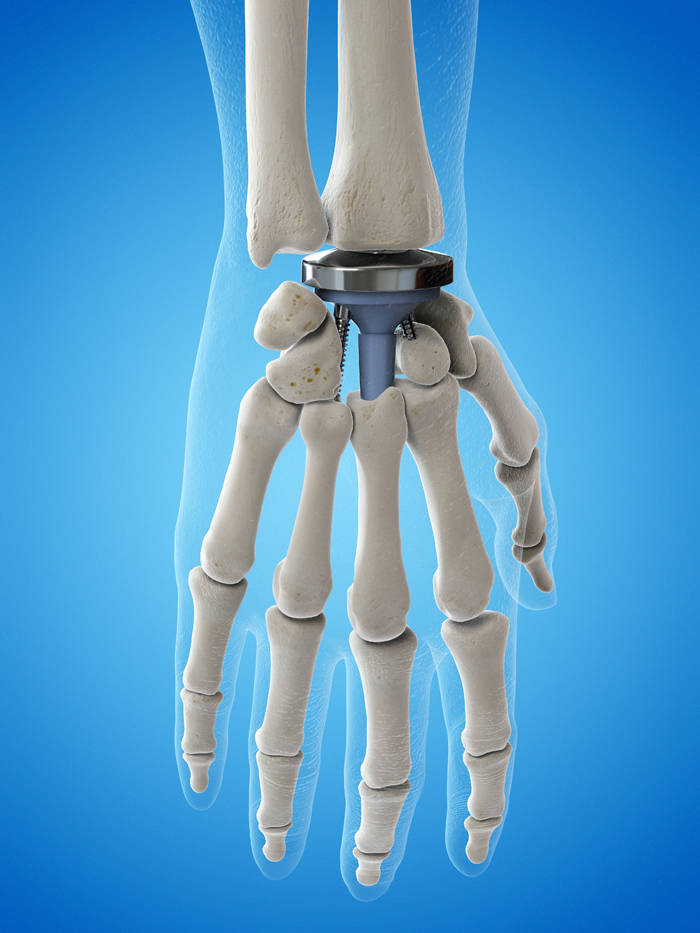Wrist Replacement Surgery in Tardeo, Mumbai
Orthopedic joint replacement is a surgery that involves the replacement of an impaired or dysfunctional joint surface and replacing it with an artificial prosthetic joint. Orthopedic joint replacement is recommended for people with severe joint pain or dysfunctioning joints. You can look for an orthopedic hospital near you for joint replacement.
Wrist joint replacement is an orthopedic surgery involving the replacement of a wrist joint in people suffering from diseases that damage it. The joint can also be damaged due to accident or trauma. Before looking for an you should know why you need such a surgery.

What do we need to know about wrist replacement?
Wrist replacement, also called wrist arthroplasty, is a complex surgical procedure that involves removal of the damaged or the diseased part of the bones comprising the wrist joint and replacing them with artificial implants.
The wrist joint is a complicated joint and comprises eight carpals and two long bones of the forearm (the radius bone and the ulnar bone). Together these bones form the wrist. These bones are covered with cartilage and elastic tissues that help in the movement of the joint.
Wrist replacement is indicated if the cartilage present between the bones wears out causing friction between the bones. Worn out cartilage may be caused by injury, infection or diseases of the bone. The friction due to rubbing of the bones causes pain and impaired movement of the wrist joint.
Why do you need wrist replacement surgery?
Wrist replacement surgery is a complex surgery suggested for patients with severe pain, deformity of the wrist, discomfort while moving the wrist and weakness of the wrist. The common indications for wrist replacement are:
- Rheumatoid arthritis leading to inflammation
- Osteoarthritis causing degeneration of the cartilage and the bone present at the joint
- Infections of the wrist
- Trauma or injury to the wrist
When do you need to see a doctor?
You need to immediately consult an orthopaedic doctor near you if you start experiencing severe wrist pain and if you are completely unable to hold and lift objects. Look for orthopedic surgeons near you, who specialize in performing wrist replacement surgery.
You can request an appointment at Apollo Spectra Hospitals, Tardeo, Mumbai.
Call 1860 500 2244 to book an appointment.
What are the benefits of wrist replacement surgery?
The benefits after the surgery are:
- Restoration of normal functions of the wrist
- Enables you to perform your activities without any pain
How is the surgery conducted?
Here's a list of things that you need to take care of before undergoing wrist replacement surgery:
- Someone must accompany you when you visit the orthopedic hospital on the day of your surgery, the reason being that you won't be able to move and perform any action.
- You should wear loose-fitting clothes.
- Follow all the instructions given by your doctor.
- Follow the dietary guidelines given to you.
- Get all the preoperative tests done that are ordered by the doctor.
The surgical procedure is performed under general anesthesia. The surgeon makes an incision on the back of the wrist joint and removes the tendons joining the bones to expose the joint, while taking precautions to not damage the associated nerves. The diseased or the damaged bone is cut and removed using a surgical saw and replaced with an artificial implant which consists of metal and high-quality polyethylene plastic. The site is sutured.
After the surgery, you should do the following things:
- Take complete rest for at least a week or as directed by your surgeon.
- Taking medication as directed.
- Stop smoking and drinking alcohol.
- Physical therapy as guided by the doctor.
- Follow up with the doctor.
Conclusion
Wrist replacement is recommended for people suffering from severe pain and bone diseases causing impairment of the joint. Consult your orthopedic doctor as soon as possible.
The risks associated with wrist replacement surgery are:
- Anesthetic allergic reactions
- Excessive bleeding
- Shock
- Blood clotting
- Infection at the incision site
They may include:
- Implant failure
- Loosening of the implant
- Damage to a nerve or muscle
- Damage to blood vessels
- Strictly follow the guidelines given by your doctor.
- Take your medications on time.
- Inform your doctor immediately about any concerns like fever, bleeding, clotting or persistent pain.
Symptoms
Our Top Specialities
NOTICE BOARD
CONTACT US
CONTACT US
 Book Appointment
Book Appointment


.svg)
.svg)
.svg)
.svg)








